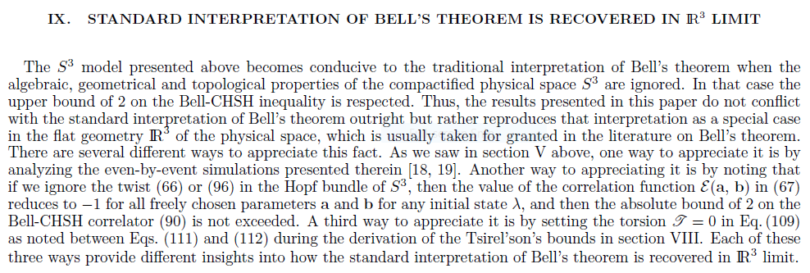Yablon wrote:Joy Christian wrote:Yablon wrote:
I prefer not to think of what was being discussed here using the expression “limit” because that has a connotation with calculus that really is not applicable here. I prefer to think of it as “observational effect on spin” or the like.
That preference may be justified in the quantum mechanical version of the model being discussed here, but it is not justified in my Geometric Algebra model. In fact, limits, as used in my GA model, are the most natural way to represent what is happening geometrically within the topology of the 3-sphere. My GA model is a purely geometrical model, with no quantum stuff.Joy Christian wrote:
Have a look at equations (72) and (73) of this paper. Note that I have used the standard calculus rule of “product of limits equal to limits of the product.” The validity of this rule in the context can be verified at once by recognizing that the same quaternion −D(a)L(a, λ)L(b, λ)D(b) results from both the limits in Eq. (72) and the limits in Eq. (73).
I think it is important to appreciate just how radical my GA approach to quantum correlations is. In it, absolutely everything concerning the experiment is represented purely geometrically.
***
However, as you know, I believe that there are isomorphisms between QM and GA, and that eventually what you are doing needs to be understood as quantum mechanics in a different mathematical language. There are insights which QM can gain from GA, and vice versa. I think it unwise to sell short, one or the other. And I think the primary problems with QM are interpretive. Jay
Yes, the problems with quantum mechanics are only interpretive. For this reason, in the 1960s David Hestenes initiated the program of Geometric Algebra. One of its aims was to reveal the purely geometrical meaning of much of the quantum mechanical formalism. For example, he showed that Pauli matrices are not mysterious but simply provide a Clifford-algebraic basis of the three-dimensional physical space. With Clifford algebra being a noncommutative algebra, his grander program was to reinterpret every quantum mechanical concept in such geometrical terms. However, none of his work or the works of those who followed his approach (which is now a thriving community) addressed the concerns of the strong quantum correlations raised by John Bell. And that is where I entered the field of Geometric Algebra and Bell's theorem in 2007: https://arxiv.org/abs/quant-ph/0703179. Incidentally, this little history demonstrates how misguided a couple of early critics of my work were who questioned my use of Geometric Algebra and puzzled why I was not using Pauli matrices instead to make life easier for me.
What you are doing is going in the opposite direction of David Hestenes's program using Geometric Algebra, but starting with my work on the strong correlations. You are relying on quantum mechanical concepts such as "the uncertainty principle." I have preferred to view my GA model for strong correlations as a result of the non-commutativity of various algebras I have used in it instead of “the uncertainty principle.” The latter comes with undesirable interpretative issues, like all other quantum mechanical concepts. The two algebras I have used in the GA model are the quaternionic algebra and an octonion-like algebra, both of which being non-commutative. They correspond to the two parallelizable spheres, S^3 and S^7. The only other possible parallelizable spheres are S^0 and S^1, which correspond, respectively, to the real and complex numbers, both of which form commutative algebras (so there is no “uncertainty” in them).
Thus, while the mathematics we are using have considerable overlap, they are not strictly isomorphic. In particular, the GA model is purely classical, whereas what you are using is quantum mechanical. At least conceptually our two approaches are quite different. Orthodox quantum mechanical notions are plagued with objective chance, irreducible randomness, uncertainty, non-reality, unsharp reality, non-locality, quantum superposition, quantum entanglement, quantum potentiality, etc. The GA model, on the other hand, is free of all of such weirdness.
***


